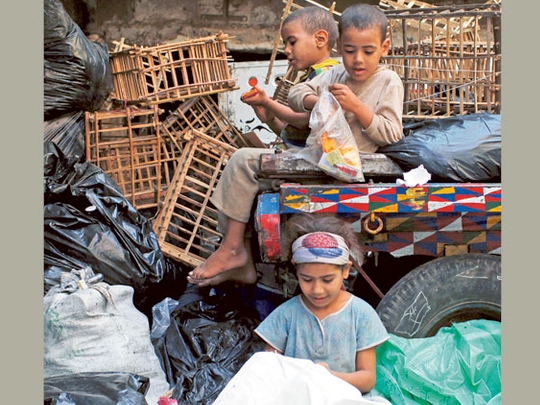
Cairo: Egypt’s total number of illiterates aged 10 years or more has exceeded 16 million in 2012, with approximately 10.3 million of them being females, a recent study conducted by the Central Agency for Public Mobilisation and Statistics (CAPMAS) revealed.
Upper Egyptian governorates had the highest rates of illiteracy, with illiteracy in Minya reaching 36.7 per cent, Beni Suef 34.8 per cent, Fayoum 34.7 per cent, Sohag 34.3 per cent, Assiut 31.7 per cent and Qena 30.3 per cent, the study revealed. High rates of illiteracy coincide with high poverty levels in the country as another study revealed that the vast number of poor were concentrated in Upper Egypt, with 43.7 per cent of the population living under the poverty line.
The study also revealed that the percentage of illiteracy among poor families has increased to 41 per cent as opposed to 24 per cent in non-poor families. Poverty and expected gender roles often entrap girls in responsibilities that exclude them from school. “Some girls are obliged to help out with the household chores, so they miss school. Also, illiterate mothers in the poorest households have a difficult time encouraging their own children’s education,” Dr Mustafa Rajab, head of the General Authority for Literacy and Adult Education (GALAE), told Gulf News.
“The poor parents dream to make their children enrol into a school to achieve something they couldn’t, but they can’t afford enough money to make that dream come true. This is a reason why illiteracy is high in rural areas in Egypt,” Rajab said.
In big cities too, where the learning process in state-run schools is as bad as in rural areas, poverty is the main reason for illiteracy. So, the children of low-income parents do not enter school or stop learning midway and therefore become illiterate.
Private lessons
“Every student, even in high schools, should take a lesson after school to understand what he was taught in school. Most poor parents can’t afford to pay for private lessons, so the student fails and leaves school,” Rajab added.
According to the National Centre for Social and Criminological Research, there were 2.6 million school dropouts in the last 10 years and 30 per cent of them, who stay away from school for a long period, eventually become illiterate.
Ahmad Zayed, professor of political sociology and Rapporteur of Education and Training Committee of the National Council for Women, said that school dropouts among women are much higher than men, especially in rural areas, where early marriages also contribute to female illiteracy. Around 80 per cent of females in Upper Egypt governorates don’t go to school.
“It’s very often that families take their daughters out of school when she is 13 or 14. By the time she’s grown up, she’ll have forgotten how to read and write properly,” Zayed said.
Illiteracy acts as a disincentive for affected persons to adequately address their situation. An illiterate person is far less likely to be able to improve his or her lot, say experts, than someone who can read and write. “If someone can’t read or write, chances are he or she will not be able to address his or her problems efficiently or improve his or her financial circumstances,” Zayed said.
Negligible punishment
Although primary schooling is free and legally compulsory for both sexes, punishment for parents taking their children out of school remains negligible. “Offending parents are merely charged a fine of $1.60,” Zayed noted.
In rural areas, the problem for women is doubly difficult to get around. A general lack of resources, added to a culture in which women’s roles are limited to the domestic sphere and farm work, hamper their access to education. Illiterate women are subjected to family pressure by husbands. Most of them, especially the illiterate ones, don’t want their wives to learn.
“It’s nearly impossible in the rural areas to convince a husband to attach his wife to a learning system. The husband is convinced that his wife only needs to serve her house, so what is the need of learning. Most girls want to learn but as they grow, this feeling vanishes with time. Therefore, in most cases, the illiterate husband is the cause for the illiteracy of his daughter and wife,” Zayed said.
Many women in rural areas also take chronic poverty and gender-related disadvantages for granted.
“In our village, women grow up to marry and have children. That is our role in life. Anything else is a luxury,” said Fauzeya, a 40-year-old woman living in Terssa village, Giza. “If I were to learn how to read, would it make a difference? Would my husband let me get a job in town, away from him?” she said, adding: “Reading doesn’t make a woman socially acceptable or useful.”
— The writer is a journalist based in Cairo.












